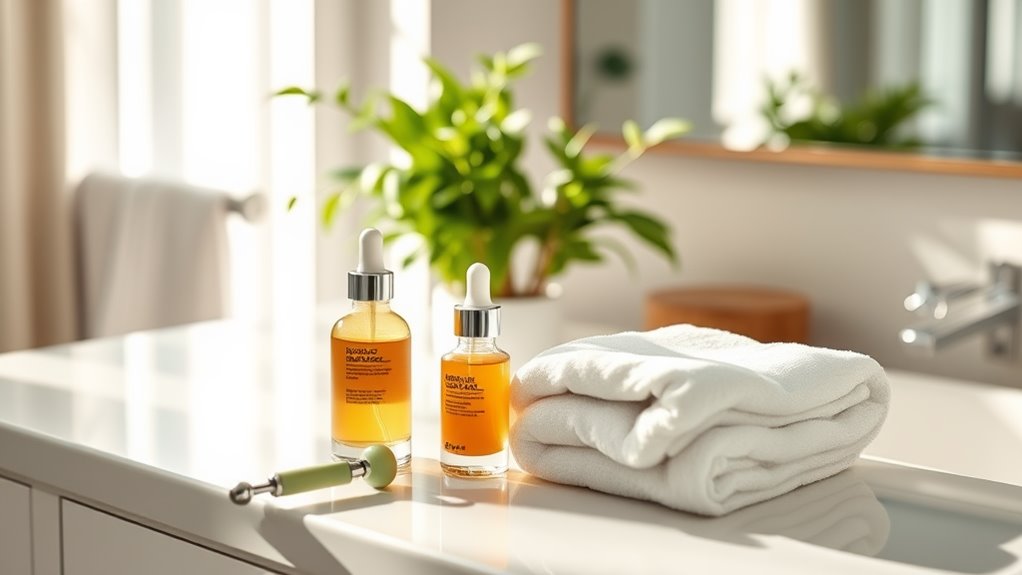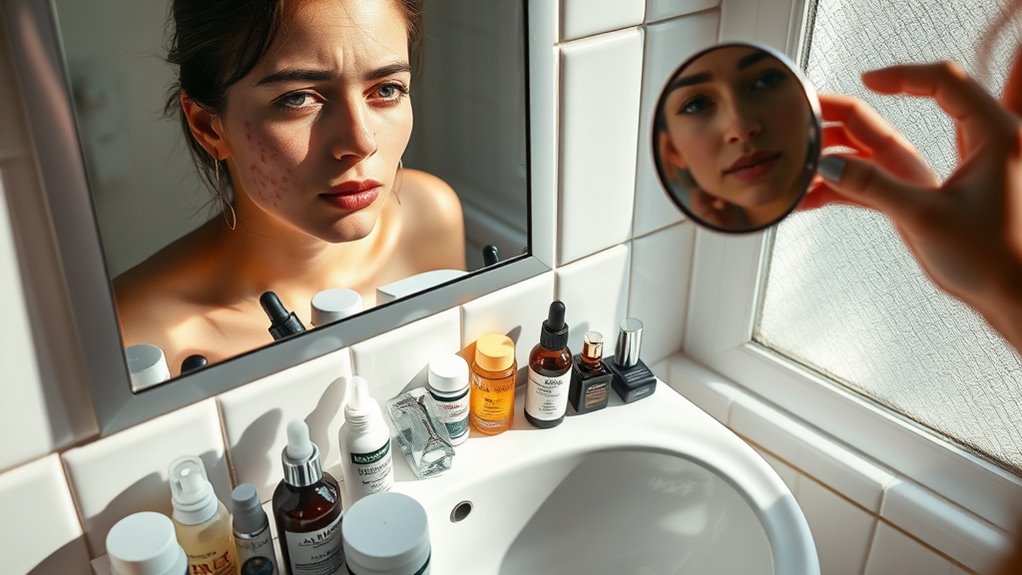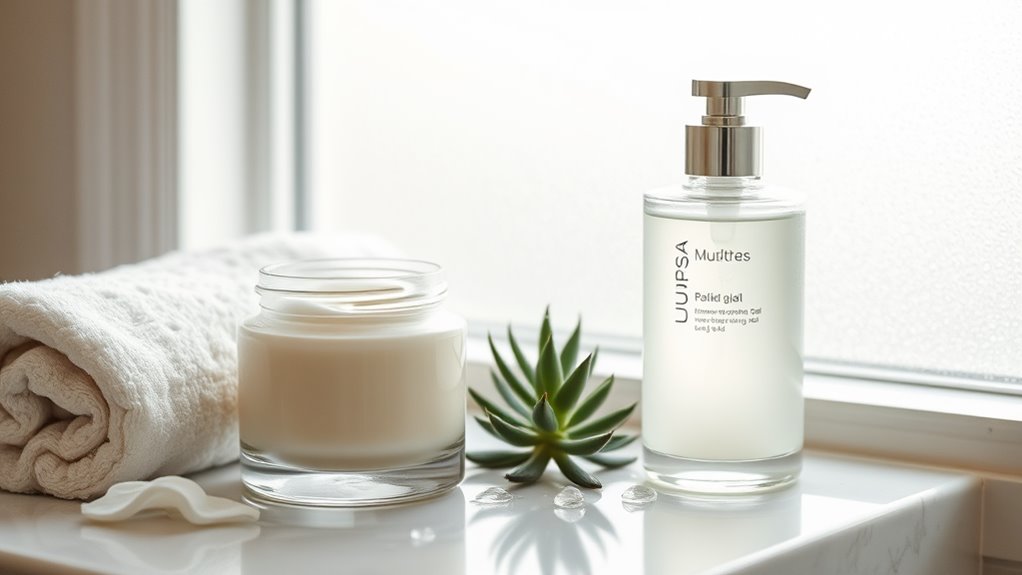The Daily Routine Dermatologists Swear By
To achieve healthy skin, start your day with a gentle cleanser, followed by a hydrating toner and a tailored serum. Don’t forget a broad-spectrum sunscreen and a lightweight moisturizer. In the evening, cleanse again, use any targeted treatments, and finish with a nourishing moisturizer. Incorporating key ingredients like retinoids and hyaluronic acid can boost your results, but be mindful of common mistakes. Stick with us to discover more tips for a radiant complexion.
Key Takeaways
- Start each day with a gentle cleanser, hydrating toner, and tailored serum for specific skin concerns.
- Apply broad-spectrum sunscreen daily, regardless of weather conditions, to prevent UV damage.
- In the evening, cleanse thoroughly, use targeted treatments, and finish with a nourishing moisturizer for overnight repair.
- Incorporate dermatologist-recommended ingredients like retinoids, hyaluronic acid, and Vitamin C for enhanced skin health.
- Maintain routine consistency and avoid over-exfoliating or mixing too many active ingredients to prevent irritation.
Morning Skincare Essentials
When you wake up in the morning, your skincare routine sets the tone for the day ahead. Start with a gentle cleanser to remove impurities and prep your skin.
Next, apply a hydrating toner to balance your skin’s pH and enhance absorption. Don’t skip the serum; choose one tailored to your skin’s needs—be it brightening, hydrating, or anti-aging.
Follow this with a broad-spectrum sunscreen, vital for protecting against UV damage. If your skin craves extra moisture, layer on a lightweight moisturizer.
Remember that daily skincare routines are essential for maintaining healthy skin and preventing future issues.
Each step is essential in your skincare routine, building a foundation for radiance and health. Master these morning essentials, and you’ll not only look good but feel empowered to conquer the day.
Evening Routine for Optimal Skin Health
As the day winds down, establishing an evening routine is essential for ideal skin health. Start by cleansing your face to remove makeup and impurities. This prepares your skin for the products that follow. Next, apply a targeted treatment, whether it’s for acne, hyperpigmentation, or hydration. Finish with a nourishing moisturizer to lock in moisture overnight. Incorporating an effective nighttime routine can significantly enhance your skin’s appearance and texture.
Here’s a simple table for your evening routine:
| Step | Product Type | Purpose |
|---|---|---|
| Cleansing | Gentle Cleanser | Remove impurities |
| Treatment | Targeted Serum | Address specific issues |
| Moisturizing | Rich Moisturizer | Hydrate and repair skin |
Key Ingredients Dermatologists Recommend
After you’ve established a solid evening routine, the next step is understanding the key ingredients that can enhance your skin’s health.
Start with retinoids, which boost cell turnover and reduce fine lines. Hyaluronic acid is another powerhouse, drawing moisture into your skin for a plump, youthful appearance.
Vitamin C brightens your complexion and protects against environmental damage. Don’t overlook niacinamide; it helps with inflammation, uneven skin tone, and strengthens your skin barrier.
Finally, consider peptides to promote collagen production and improve elasticity. Additionally, incorporating anti-aging oils like argan or rosehip can provide essential nutrients that support skin repair and hydration.
When you incorporate these ingredients thoughtfully, you’ll create a synergistic effect that maximizes your skincare regimen. Mastering these key components will elevate your routine and lead to healthier, more radiant skin.
Common Mistakes to Avoid
Even with a well-planned skincare routine, it’s easy to make mistakes that can undermine your efforts.
One common error is skipping sunscreen, even on cloudy days. UV rays can penetrate clouds, leading to skin damage.
Another mistake is over-exfoliating; while you want to remove dead skin cells, too much can irritate your skin and compromise its barrier.
Don’t forget to patch-test new products before applying them all over your face—this helps prevent adverse reactions.
Also, avoid using multiple active ingredients simultaneously, as this can cause irritation or reduce efficacy.
Finally, remember that consistency is key; sporadic routines won’t yield the results you desire.
Additionally, be cautious about face-washing mistakes, as improper techniques can further damage your skin.
Stay committed and be mindful of these pitfalls for ideal skin health.
Professional Tips for Long-lasting Results
To achieve long-lasting results in your skincare routine, it’s essential to incorporate a few professional tips that can make a significant difference.
Mastering these elements will elevate your regimen and enhance your skin’s health.
- Consistency is Key: Stick to your routine daily.
Skipping steps can hinder progress, so make it a non-negotiable part of your day.
- Choose Quality Products: Invest in well-formulated products that suit your skin type.
High-quality ingredients yield better results and are worth the splurge.
- Hydration Matters: Always hydrate your skin, both internally and externally.
Drinking enough water and using a suitable moisturizer can dramatically improve your skin’s appearance. Additionally, chronic dehydration can accelerate aging processes, emphasizing the need for proper hydration.
Frequently Asked Questions
How Often Should I Change My Skincare Products?
You should change your skincare products based on your skin’s response. If you experience irritation or don’t see results after six to eight weeks, consider trying something new to better suit your needs.
Can Diet Affect My Skin Health?
Yes, your diet can greatly affect your skin health. Eating nutrient-rich foods enhances your skin’s appearance, while sugary or processed foods may lead to breakouts. Prioritize whole foods to nourish your skin from within.
Is It Necessary to Wear Sunscreen Indoors?
Yes, it’s necessary to wear sunscreen indoors. UV rays can penetrate windows, causing skin damage over time. Protect your skin consistently, even when you’re inside, to maintain its health and prevent premature aging.
What Age Should I Start Using Anti-Aging Products?
You should consider starting anti-aging products in your mid-20s. Early prevention helps maintain skin elasticity and hydration. Focus on ingredients like retinol and antioxidants to combat signs of aging effectively and promote youthful skin.
How Can Stress Impact My Skin Condition?
Stress can trigger breakouts, exacerbate conditions like eczema or psoriasis, and lead to dullness. When you’re stressed, your body produces cortisol, which can disrupt your skin’s balance. Managing stress is essential for maintaining healthy skin.





